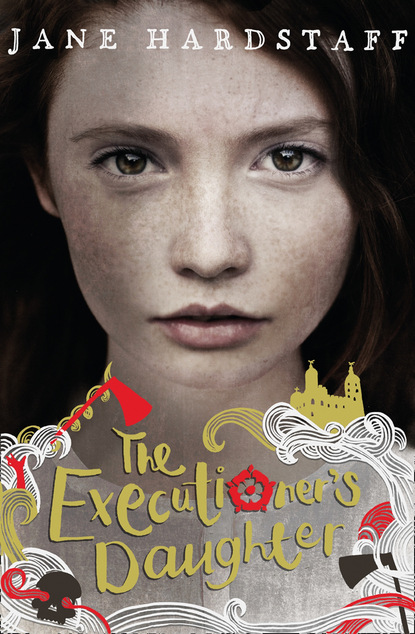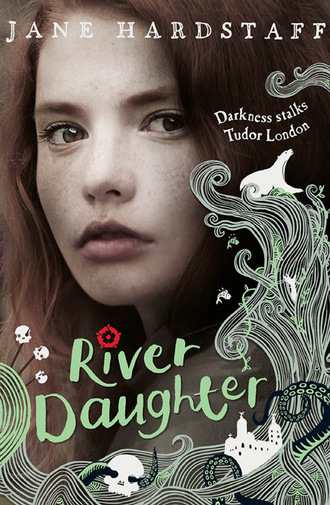
Полная версия
River Daughter



First published in Great Britain in 2015 by Egmont UK Limited
The Yellow Building, 1 Nicholas Road, London W11 4AN
Text copyright © 2015 Jane Hardstaff
Illustrations copyright © 2015 Joe McLaren
The moral rights of the author and illustrator have been asserted
First e-book edition 2014
ISBN 978 1 4052 6832 5
eISBN 978 1 7803 1389 4
www.egmont.co.uk
A CIP catalogue record for this title is available from the British Library
Typeset by Avon DataSet Ltd, Bidford on Avon, Warwickshire
All rights reserved. No part of this publication may be reproduced, distributed, or transmitted in any form or by any means, or stored in a database or retrieval system, without the prior written permission of the publisher.
Stay safe online. Any website addresses listed in this book are correct at the time of going to print. However, Egmont is not responsible for content hosted by third parties. Please be aware that online content can be subject to change and websites can contain content that is unsuitable for children. We advise that all children are supervised when using the internet.
For Frea
CONTENTS
Cover
Title page
Copyright
Dedication
1 Strange Fish
2 Old Lives, New Lives
3 The Promise
4 Boat Thief
5 Bonfires and Cannons
6 Cat’s Head
7 Eel-Eye Jack
8 The Great White Bear
9 On the Roof of The Crow
10 Little Elizabeth
11 Whipmaster
12 Hiding
13 The Pit
14 Catching Salmon
15 Salter’s Way
16 Jenny Wren
17 Slider
18 The River Inside
19 Friendship Broken
20 Bladder Street
21 Princess Redhead
22 An End to All This
23 Bear Fight
24 The Slider Rises
25 Boat of Leaves
A note from the author
Acknowledgements
Also by Jane Hardstaff
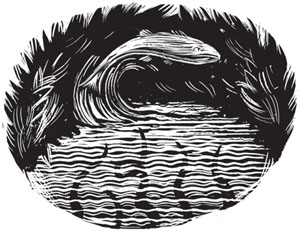
CHAPTER ONE
Strange Fish
‘Sweet Harry’s scabs! Yer like a frog with hair, Leatherboots.’
‘Bet you’ve never seen a frog do this!’
Moss dived down, turning a full somersault as she went, leaving Salter grinning on the riverbank. As she stretched to touch the stony river bed, she felt the drag of the water against her body. The river here was in no hurry. No roar, no raging currents, just a wide bend and a grassy bank that ushered the moorhens politely on their way. Moss knew this stretch of river as well as she knew the scratches on her knees. She knew the vole holes. She knew where the kingfishers flicked their jewel wings. She knew every dip in the river bed. Because it was here she’d learnt to swim.
She wore an old apple sack with holes cut for her neck and arms. At first Moss had gasped at the clumsiness of her kicks, fists gripped tight to the branch that kept her afloat, her friend never more than a few steps away. On the surface was a spluttering fight for air. Yet under the water, the quietness calmed her. So Salter had tied a rope around her middle and she’d let herself sink, eyes open, arms outstretched, and gradually her legs had learned a rhythm that propelled her body forward. When she ran out of breath, she would rise to the surface and gulp another. And if she strayed too far into the river, Salter would haul her back on the end of his rope like a strange fish.
Now the rope was off. More than a year had passed since she, Pa and Salter had left London, and though Salter said she frightened the trout, Moss had spent much of those summer months swimming the river.
There were times when Moss could barely believe how different this new life was to their old. All those years in the Tower of London, the taunts of the Tower folk, the thump of the drum on Execution Day, Pa standing on the scaffold with his axe in his hands. And Moss herself, holding her wretched basket ready to catch a rolling head. Just thinking about it made the bile rise from her stomach. How many hours had she spent gazing from the battlements of the Tower, willing the mighty river Thames to carry her away from that miserable life? The river had saved her, thought Moss. But it had almost killed her too.
A breeze rustled the leaves on the willow. Autumn was coming and it would soon be too cold for dipping. She stared down at her feet, curled against the stones of the river bed. This was a very different river to the Thames. Here the water was clear and waist deep. The only place for fish to hide was among the water crowfoot, giant green ribbons that swayed with the flow. But Moss avoided the tangled weeds and the clutch of anything that might drag her down.
Salter was lying in the grass, his dirt-smudged face propped on his elbows.
It hadn’t been easy for the river boy to leave London or his beloved shack on the banks of the Thames. It had been his home, where he’d fished and thieved and managed to stay warm, winter after winter. But from the moment he’d first hauled a near-drowned Moss into his boat, their lives had changed. Though he would never admit it, they now had something that neither of them wanted to lose.
They were friends.
He was watching her now.
‘Do you have to go right to the middle?’ he called. ‘Those great hooves’ll scare the fish all the way to Silbury!’
‘Don’t worry about me, Smudgeface!’
‘I ain’t worried about you! I’m fishin later. Just don’t want me catch driven away that’s all.’
Moss grinned. ‘Well, catch this, fisher boy!’ She ducked under and swam to the bank, bobbing up in front of Salter’s face with a splash.
‘See.’
‘I don’t see nothin.’
‘I can swim, or hadn’t you noticed?’
She could see his smile coming. A little crows-feet crinkle in the corner of his eyes. She flipped a handful of water at his face and ducked back down, kicking strong strokes back out into the river. But when her head broke the surface, Salter wasn’t looking at her any more. He was staring downriver.
‘Hey!’ she called, ‘Come on in!’
He stood up, still peering into the distance.
‘What is it?’ she said.
‘Dunno.’
Moss waded a few paces to the middle of the river where she had a clear view past the bend. She screwed up her eyes and stared.
There was something.
A dark ripple, moving slowly towards her. In front of it, specks of silver darted from the river to the bank, lightning quick, threading the grass with a shining mesh.
‘What is that?’ said Moss.
Salter squinted into the sunlight. ‘Pope’s earholes! It’s the fish!’
‘Fish?’
‘The fish are jumpin. Out of the river.’
Moss stared at the bizarre sight before her. Salter was right. Driven forward by the dark ripple in the water, the fish seemed to be panicking. Leaping high out of the river and throwing themselves on to the banks. Landing in a silver heap where they gasped and jerked, helpless in the grass. She watched, mesmerised by the jumping fish and by the strange shape behind them, getting closer and closer.
‘Fish leapin to their deaths . . .’ Salter was shaking his head. ‘Ain’t never seen nothin like it.’
‘It’s like they can’t stand to be in the water,’ said Moss. ‘Like they can’t get out fast enough.’
Salter jumped, as though someone had whacked the back of his head.
‘Get out of the water. Now !’
‘What?’
‘Don’t argue, Leatherboots! Do as I say. Quick!’
Moss dived down again, her arms pulling against the current. But something was wrong. She’d hardly moved.
‘Swim!’ Salter’s muffled voice yelled above her.
There was a splash. Salter was still shouting. ‘I’m comin! Keep swimmin, Leatherboots! Don’t stop!’
All at once Moss’s eyes filled with silt. She spluttered to the surface and saw Salter in the river, staggering towards her. The water was thickening with mud. It pressed in on her body, slowing her arms and legs. She tried to reach down with her feet to touch the solid river bed, but it was gone. In its place was shifting mud that oozed between her toes. All around her, the river was brown and choking, a muddy rag stuffed down its throat.
‘Don’t stop!’ Salter was still yelling, ‘Keep goin!’
But her feet wouldn’t move. The mud gripped her, warm and sticky, holding her fast.
‘Salter! I’m stuck!’
‘Wait!’ He lunged forward, arm outstretched. As if in some slow dream, Moss watched the water drag him under.
‘SALTER!’
He was gone.
Now the mud beneath her began to tug at her feet. Sucking her down. Inch by inch. And the more she thrashed, the deeper she sank. Her flailing arms beat the surface to brown froth as her head was pulled slowly under.
Something brushed against her body. Through the stew of water she saw lashing fronds of water crowfoot, felt it against her legs, coiling and tightening. But instead of dragging her further down, the crowfoot seemed to be pulling upwards, as though trying to free her from the mud. Then a mighty rush of current snatched her up and she felt herself bowl over and over until all at once it stopped. Her feet found the stony river bed and she pushed with all the force she could muster, exploding to the surface in choking breaths.
On the opposite side of the river, Salter was heaving himself towards the bank.
The mud had gone. The water was clear, the crowfoot swaying gently, great, trailing tendrils, stretching towards her. She kicked out for the bank and the crowfoot seemed to pull back. But as it did, a shadow curled underneath. Too big for a fish.
For a flit of a second, the shadow showed itself. In the tangle of weeds.
What she saw almost stopped her heart.
A hand. Then a face. Then it was gone.
Moss dived back into the river, floundering through the weed, dragging it out in great clumps, pulling it apart.
Nothing. The shadow had vanished, and with it, the face.
It was a face she’d never seen before. Yet it was familiar. Green eyes, a tangle of hair. So like her own. But older, sadder.
She couldn’t be sure. She’d never seen her.
Her mother’s face.
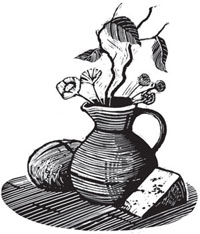
CHAPTER TWO
Old Lives, New Lives
It was dusk by the time Moss and Salter made it back to the village. She had stashed her apple sack in the hollow of the willow as usual, changing back into her dry dress in the bushes. Salter was wet through. But despite his sodden clothes, he kept up a cheery banter all the way from the fields to the lane. Every time Moss tried to mention the river, he changed the subject, so in the end she gave up and slunk into her own thoughts. In her head, a picture shimmered. She’d only seen it for a moment. But she had seen it.
The face. Her mother’s face? Was it possible? But her mother was dead. Could that have been her spirit in the river today? She turned the thought over and over. A year and a half ago, she’d seen with her own eyes how the dead could be given life by the cold waters. The Riverwitch had revealed herself. A restless spirit who haunted the rivers, looking for children to snatch.
Ignoring Pa’s pleas to stay away from the river, Moss had left him and made her way out of the Tower. And on Moss’s twelfth birthday the Riverwitch had come for her, just as she’d promised on the day Moss was born. She’d dragged Moss down to the depths of the murky Thames. But there in the swirl and suck of the river, Moss succeeded in changing her fate. And the Riverwitch had let her go.
Moss, Pa and Salter had walked away from their old lives in London and settled in a country village where Pa was welcomed as the new blacksmith. During those early days, Moss had wondered whether the Witch would come for her again. But the more she’d swum in the gentle village river, the bolder she’d become, until the strangeness of that winter had seemed so far away it was almost unreal. She’d buried those memories deep, hoping she’d never have to dig them up. The Riverwitch was gone from their thoughts and their lives. But today . . . what had she seen? The coiling weeds had filled her head with thoughts of the Witch. Yet the face in the water was not the face of the Riverwitch.
The squat little forge was a welcome sight. Moss pushed at the door. Warmth and smoke wrapped her like a blanket. Pa was already asleep, a rising, falling bundle on his pallet. They trod past him softly and settled on the low stools by the fire. The clear October sky brought a chill to the air and Pa allowed a log or two to burn way into the night.
‘Rabbitin tomorrow,’ said Salter. ‘Set the traps yesterday an’ I’m goin back to see what I’ve got first light.’
‘Salter . . .’
‘Yep?’
‘What was that, in the river?’
‘Search me. Some sort of freak current. Ain’t never seen it like that. All whipped up with mud an’ stinkin like a badger’s bum. Best not go swimmin fer a while, Leatherboots. Too dangerous. This time we was lucky.’
But it didn’t feel like luck to Moss. It felt like the river had changed. And the face in the waterweed – she couldn’t stop thinking about it.
‘Salter,’
‘Mmm.’
‘Can I ask you something?’
‘If you must. I can tell that head of yers is stewin. Though if you was to ask me, I’d say that questions only lead to more questions an’ don’t make yer troubles go away.’
Moss gave the fire a poke. On the one hand, she liked the way Salter just got on with life, making the best of things wherever possible. But he never questioned why things were the way they were, and this frustrated her no end. She supposed he couldn’t help it. After all, he’d been just six years old when his parents died. From that day on, alone, with nothing but his hands and his wits, he’d had to fend for himself. ‘Bread first, then morals,’ he always said. Survival was the most important thing and Salter had learned not to ask too many questions, of himself or anyone else. But the village was a world away from that harsh life, thought Moss. And there were moments when she wondered if there was more to Salter than he was letting on.
‘You think too much,’ he said.
‘Do I? And what about you? What goes on in that head of yours? Or is just full of rabbits?’
Salter grinned. ‘Yep. Fish an’ rabbits, that’s me, shore girl.’
‘Shore girl? I can swim almost as well as you.’
‘All thanks to my brilliant teachin.’
‘Oh, is that what you call it? Holding a rope and shouting from the bank?’
‘I could have just thrown you in and watched you sink.’
‘Do you know, sometimes I can’t quite believe it. All this. Swimming in the river, us living here, Pa working the forge. It’s more than I could ever have hoped for.’
Salter eyed her. ‘So what’s on yer mind, then?’
Moss hesitated, not even sure herself what she wanted to say.
‘Go on, Leatherboots, out with it!’
‘Well, here in the village, we have food, Pa has work, I’m not catching heads in a basket. Life is good, Salter.’
‘Yes it is.’
‘It’s just that, do you ever, sometimes . . .’
‘What?’
‘. . . feel that something is missing?’
‘Missin?’ Salter’s eyes widened. ‘Missin.’ He rolled the word around his mouth. ‘Well,’ he said, ‘since yer askin, I miss the old river.’
Moss sat up.
‘Yes, I do,’ said Salter. ‘The rush and the roar of the big river. This little stream is nice and the fish are fat, but it ain’t the Thames. Dirty and dangerous, that old river can snatch you quick as a rat’s fart and roll yer body like a barrel. But on a good day it’s wide and bright as the sea. And I think about the shack and the smoker and the sound of that old river breathin in and out on the shore. So if I was honest, and I don’t see why I should be, but if I was, then I miss it.’
Salter eyes were shining as the memory of his old life poured from his lips. Now Moss thought about it, it made sense that he missed the river that he’d rowed and fished all his life. She wondered how often his thoughts drifted back to those old ways.
‘So what about you, Leatherboots?’
‘Me?’
‘You said yerself, life is good here. So what’s the problem?’
‘It’s kind-of hard to explain. All my life I dreamed of being far away from the Tower and the Hill and, you know, the executions. To be free. To be with Pa, living somewhere just like this, in a village with fields and bluebell woods.’
‘So? Ain’t too many that get their dreams fer real.’
‘Yes, but now we’re here,’ Moss stared at the slow burn of the fire, logs shedding their feathery ash. ‘Now we’re here and everything’s fine, well, I guess there’s room to think of other things.’
‘Such as?’
‘Well, things . . . from our past. Do you ever think of your father and your mother?’
Salter blinked.
‘I was just wondering,’ she said.
Salter’s gaze dropped. He shuffled the embers with the toe of his boot.
‘Spend too long in the past,’ he said, ‘And you might not find yer way back.’
The fire spat. On his pallet, Pa shifted.
Salter stood up. ‘I’m turnin in. Much as I’d like to, can’t hang about all night chit-chattin.’
‘Night, Salter.’
But he didn’t reply. Moss watched him splash a little water on his face from the bucket. Then he disappeared into his corner, drawing the heavy wool curtain behind him.
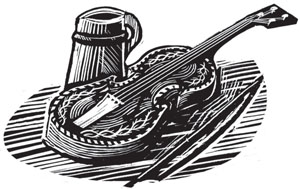
CHAPTER THREE
The Promise
‘Moss!’ Pa was calling from the forge.
‘Coming Pa!’ Moss beat the soil from her hands and clomped in from the vegetable patch where she’d been digging up skirrets. Pa was already pumping the bellows, sparks shooting out of the fire.
‘Here.’ She shook the skinny fist of roots. ‘Not too bad for a second crop. If Salter gets us some rabbits, we’ll have a good stew.’
Salter had gone at first light. Moss had heard him from her pallet in the little alcove by the fire. She’d said nothing, just listened to the sound of him pulling his boots on, munching on a hunk of bread while he dressed. She’d wriggled down under her blanket. These noises were as familiar to her now as the crackle of logs. It was as though Salter had always lived with them.
Pa was tying the beaten leather apron behind his back. She looked to the table. On it was a little jug with a sprig of hazel poking out of the top. She’d placed it there for Pa that morning before she’d gone out. All those months ago when she’d walked out of the Tower with no word of where she was going, Pa was so distraught it had almost killed him. A sprig of leaves or a few flowers left in the jug was her unspoken way of telling him that she was coming back. That she loved him.
‘Farmer Bailey’s bringing up Big Sal for shoeing this morning,’ said Pa. ‘She’s an old mare and no mistake. Most wouldn’t bother with an animal you can neither ride nor work. But Farmer Bailey’s got a soft spot for that horse.’
‘I’ve seen him,’ said Moss. ‘He leads her to the sweetest meadow grass. Talks to her while she eats.’
Pa smiled. ‘Would you say she listens?’
‘Yes, I’m sure she does. And you know, Pa, I think Big Sal talks to Farmer Bailey too.’
Pa nodded. ‘It’s a rare friendship, that one. Men like to think they are the master of beasts. But I don’t think Big Sal would agree.’ He took down the hammer, tongs and creaser from their hooks on the wall.
Moss watched him lay his tools neatly next to the anvil. Gentle, careful Pa. Who avoided the river if he could and liked to walk the woods at sunset. Moss had spent many evenings last autumn crunching through the leaves by his side. This way, little by little, Moss had learnt of her mother. That she was green-eyed and tangle-haired. That she had freckles on her nose and a dimple in her cheek and was so much like her daughter. That she sang when she was sad. That she’d once climbed to the top of a tree to pick a red-ripe apple, just for Pa.
Moss clutched at these fragments of her mother. But no matter how hard she tried to make Pa’s memories her own, she couldn’t. They were from a distant place that only he could reach. All the same, she clung to them. They were all she had.
‘There are still blackberries in West Woods,’ said Moss. ‘I’ll go up there now, see if I can catch Salter on his way back.’
‘Just a minute.’
‘What is it?’
‘Over there,’ said Pa. ‘There’s something for you.’
‘For me?’
There was a sackcloth bundle on the table, tied with string.
‘Open it,’ said Pa.
Moss pulled at the string and the sackcloth fell away. Inside was more cloth, a smooth, tightly-woven wool. Carefully, Moss picked it up, unfurled it.
‘Oh, Pa.’
It was a dress. Soft and green. The colour of new leaves.
‘Pa, how did you –?’
‘We’ve been plenty busy since we got here,’ he said. ‘Shod horses, mended hoes, made new knives for the innkeeper. Our first year was a good year, Moss. And you’ve outgrown those old rags you’ve had since goodness knows when.’
‘But this must have cost so much, Pa.’
‘Well, never mind that.’ He smiled and his tired face brightened, and Moss could see how happy it made him to give her this dress.
‘I’ll try it on,’ she said.
She tucked herself into her little alcove, pulled off her old dress and tugged the new one over her head. The wool was light against her skin. Compared to the scratch of the coarse garments she’d always worn, this was like stepping into silk. She stared down at herself, then felt suddenly shy.
‘Well?’ said Pa, ‘Does it fit you?’
‘It does, Pa,’ said Moss, ‘It’s the most beautiful dress.’
She wrapped her skinny arms tight around him. Pa had worked so hard to build this life for them. How could she possibly think something was missing?
‘Pa,’
‘Yes?’
‘Do you sometimes think of her?’
Pa loosened Moss’s hug so he could look into her face.
‘Your mother?’
Moss nodded.
‘Yes, I do.’
‘Does she seem far away?’


